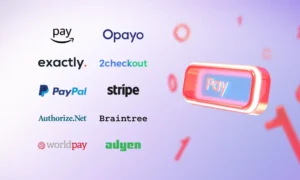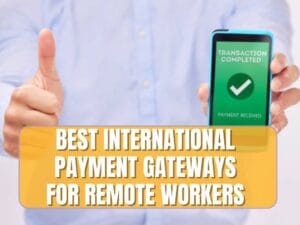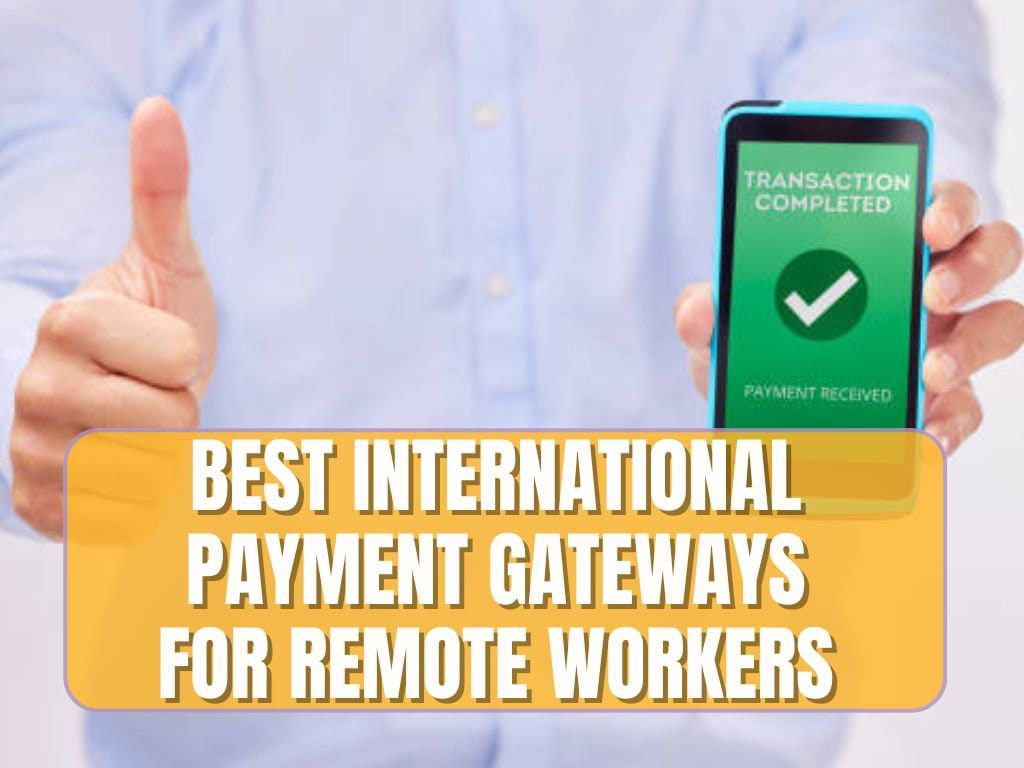
You Shocked?? ALL our articles ranks so high on Google to drive fast traffic, sales, rich clients and passive revenue for us and other businesses.. Contact Us For Yours
As always, International payment gateways have become the lifeline for freelancers and remote workers who hustle across borders.
But let’s face it..
Getting paid remotely isn’t always smooth.
Imagine delivering a high-ticket project to a client overseas, only to spend days or weeks! trying to find a reliable platform to receive your funds.
And even in the worst scenario.. some payment platforms take a huge chunk in fees, and others simply don’t work well in countries like Nigeria.
That’s the kind of pain that makes you question whether remote work is worth the stress.
But here’s a shocking fact!
A report once revealed that over 60% of African freelancers lose jobs simply because clients can’t find a reliable way to pay them.
Yup, talent isn’t the issue here.. access to efficient international payment for freelancers and remote workers really is.
That’s why understanding the best international payment gateways is no longer optional
It’s essential to your success if you want to thrive in this digital age and truly earn in dollars consistently.
So whether you’re a designer, copywriter, digital marketer, or virtual assistant, this post will walk you through trusted platforms that help you get paid faster, with lower fees and minimal drama.
At the end of this post, you’ll not only discover global payment solutions for freelancers..
You’ll also get perfect answers to:
- Which payment gateway is best in worldwide?
- Which is the fastest payment gateway?
- Which payment app is best for international transactions?
- Best platform to receive international payments in Nigeria
- Best card for international payment in Nigeria
What Are International Payment Gateways?
International payment gateways are online platforms that facilitate secure financial transactions between businesses, clients, and freelancers across different countries.
Think of them as digital bridges that connect your bank account to your client’s payment method, handling everything from currency conversion to fraud protection.
These cross-border payment platforms are essential for remote workers who need to receive payment globally, ensuring funds move smoothly regardless of where you or your client are located.
These gateways support a variety of payment methods such as credit cards, bank transfers, digital wallets, and even cryptocurrencies in some cases.
They’re designed to be secure, using encryption and compliance with standards like PCI DSS to protect your money.
For freelancers, international payment gateways are a lifeline, allowing you to get paid remotely without the hassle of traditional banking delays or exorbitant fees.
Why should remote workers care about choosing the right gateway?
Let’s explore the reasons next.
Why Remote Workers Need a Reliable Global Payment Gateway
A reliable global payment gateway is non-negotiable for remote workers who want to thrive in today’s interconnected world.
As a freelancer, your clients might be in the U.S., Europe, or Asia, and you need payment solutions that can handle international payment for freelancers without eating into your earnings.
Well, here’s why these platforms matter:
First, they simplify cross-border transactions.
Without international payment gateways, you’d be stuck navigating complex bank transfers, high fees, and unfavorable exchange rates.
Second, they offer security.
Secured online payment systems protect your earnings from fraud, giving you peace of mind.
Third, they save time and money.
The best payment gateways for global clients offer competitive fees and fast transfers, so you can focus on your work instead of chasing payments.
Finally, they provide flexibility..
Whether you need to pay for remote work tools or invest in the best tech courses with certifications to upskill, these platforms make it easy to manage your finances.
For example, imagine you’re a web designer in Port Harcourt working with a client in London.
A good payment gateway ensures you get paid in Naira without losing a chunk to conversion fees.
Or, if you’re planning to move to Europe as a freelancer, platforms like Wise can help you manage multi-currency accounts seamlessly.
So which platforms stand out for remote workers?
Let’s break down the top eight international payment gateways.
Best International Payment Gateways For Remote Workers
The best way to get paid internationally as a remote worker depends on your location, client base, and transaction needs.
Below, we’ve rounded up eight of the best international payment gateways, each with unique strengths to help you receive payment globally.

2 Business Ebooks to Sell More in Your Business
From global giants to region-specific solutions, here’s what you need to know.
1. PayPal for Remote Workers
PayPal is a household name in the world of international payment gateways, and for good reason.
With support in over 200 countries and 25 currencies, it’s one of the most accessible payment platforms for remote workers.
Its user-friendly interface makes it easy for freelancers to send invoices, receive payments, and withdraw funds to local bank accounts or a PayPal debit card.
PayPal Pros: PayPal’s widespread acceptance means most clients already have an account, simplifying transactions.
It offers robust fraud protection and integrates with platforms like Upwork and Fiverr.
For freelancers, the ability to create professional invoices and track payments is a big plus.
PayPal Cons: Fees can be steep, 2.9% + $0.30 per transaction, plus up to 4.4% for international payments.
Currency conversion rates aren’t always competitive, and some users report account freezes or delays in fund releases.
PayPal is Best for: Freelancers who prioritize ease of use and work with clients on major freelance platforms.
How does Stripe compare for tech-savvy remote workers?
Let’s find out.
2. Stripe for Remote Workers
Stripe is a favorite among developers and tech-savvy freelancers, offering a robust platform for international payment for freelancers.
Supporting over 135 currencies and 46 countries,
Stripe is a powerhouse for global payment solutions for freelancers.
Its strength lies in its flexibility APIs allow you to customize payment flows, making it ideal for those who run their own websites or need tailored solutions.
Stripe Pros: Stripe’s transparent pricing (2.9% + $0.30 per transaction, plus 1% for currency conversion) is straightforward.
It supports a wide range of payment methods, including Apple Pay, Google Pay, and “Buy Now Pay Later” options like Klarna.
Its fraud prevention system, Radar, uses AI to detect suspicious transactions.
Stripe Cons: Stripe’s advanced features require technical know-how, which might overwhelm non-techy freelancers.
Customer support has also faced criticism for being unresponsive at times.
Stripe is Best for: Freelancers with technical skills or those running e-commerce businesses who need customizable payment solutions.
Can Payoneer offer a better alternative for cross-border payments?
3. Payoneer for Freelancers
Payoneer is a go-to for freelancers needing global payment solutions for freelancers
Especially those working with international marketplaces like Amazon, Airbnb, or Upwork.
Operating in over 200 countries with 150+ currencies, Payoneer’s virtual bank accounts let you receive payments as if you had a local account in the client’s country.
Payoneer Pros: Payoneer’s low fees for receiving payments from other Payoneer accounts (free) and its prepaid Mastercard for easy withdrawals are major draws.
It also integrates seamlessly with freelance platforms, making it a top choice for international payment for freelancers.
Payoneer Cons: Fees for non-Payoneer card payments (up to 3%) and currency conversions can add up.
The platform’s interface isn’t as intuitive as PayPal’s for beginners.
Payoneer is Best for: Freelancers working with global marketplaces or those needing virtual bank accounts for local payments.
What about a platform that prioritizes low-cost transfers?
Let’s look at Wise.
4. Wise for Remote Workers

Wise (formerly TransferWise) is a game-changer for remote workers who want to save on international payment gateways.
Known for its transparent fees and mid-market exchange rates, Wise supports payments in 70+ countries and 40+ currencies.
You can link a Wise Business account to platforms like Stripe or Amazon to receive payment globally with minimal costs.
Wise Pros: Wise’s fees are among the lowest, which is often 0.4% to 2% per transaction and its exchange rates are highly competitive.
The multi-currency account lets you hold and convert funds without hefty bank charges.
Wise Cons: Wise is better for bank transfers than card payments, and its mobile app can be less intuitive for complex transactions.
It’s also not as widely accepted as PayPal for client payments.
Wise is Best for: Freelancers who prioritize cost savings and work with clients paying via bank transfers.
Is 2Checkout a viable option for global e-commerce freelancers?
5. 2Checkout (Now Verifone)
2Checkout, now rebranded as Verifone, is a versatile platform for cross-border payment platforms, supporting over 200 countries and 45+ currencies.
It’s particularly strong for freelancers running e-commerce businesses, offering features like subscription billing and fraud protection.
Verifone Pros: No setup or monthly fees make it budget-friendly.
Pricing varies by plan (3.5% + $0.35 for 2Sell, up to 6% + $0.60 for 2Monetize), and it supports PayPal, credit cards, and local payment methods like Alipay. Integration with over 120 shopping carts is a bonus.
Verifone Cons: Higher transaction fees compared to Stripe or Wise, and a 2% cross-border fee may apply in high-risk countries.
It’s less suited for freelancers not focused on e-commerce.
Verifone is Best for: E-commerce freelancers or those needing subscription billing tools.
Can Skrill offer ascended the throne for digital wallets?
Let’s see.
6. Skrill for Remote Workers
Skrill is a digital wallet and payment gateway that’s gaining traction among remote workers for its flexibility in international payment gateways.
Supporting 40+ currencies and 100+ local payment methods, Skrill is ideal for freelancers handling diverse transactions.
Skrill Pros: Low transaction fees (1.9% for most transactions) and no monthly fees make Skrill cost-effective.
It offers a free prepaid Visa card and supports cryptocurrencies, making it versatile for pay for remote work tools.
Skrill Cons: Users need a Skrill account for payments, which may limit client accessibility.
Currency exchange fees (up to 3.99%) can also sting for international transfers.
Skrill is Best for: Freelancers in digital industries or those dealing with cryptocurrency payments.
What about larger businesses with complex needs?
Is Authorize.Net really the answer?
7. Authorize.Net for Remote Large Businesses
Authorize.Net is a highly customizable option among international payment gateways, ideal for larger freelance businesses or agencies.
Operating in the US, UK, Canada, Australia, and Europe, it offers secure payment solutions for global clients.
Authorize.Net Pros: Flexible integration options and advanced security features like tokenization and 3D Secure authentication.
It supports multiple payment methods and integrates with major e-commerce platforms.
Authorize.Net Cons: Limited to specific regions, making it less global than others. Monthly fees ($25) and setup costs can be a barrier for small-scale freelancers.
Authorize.Net is Best for: Large freelance businesses or agencies with established operations in supported regions.
How do African freelancers find the best payment solutions?
Amazing wall arts for your space, See More..
Let’s check out Flutterwave.
8. Flutterwave for African Remote Workers
Flutterwave is a leading payment gateway for African remote workers, with a focus on emerging markets.
Operating in 11 African countries and expanding globally, it supports mobile payments, virtual cards, and local bank transfers.
Pros: Affordable transaction fees and a free online store feature make it ideal for African freelancers.
It integrates with platforms like PayPal and Payoneer for global reach.
Cons: Limited global presence compared to PayPal or Stripe. Its focus on Africa may not suit freelancers with diverse client bases.
Best for: African freelancers or those targeting African markets.
9. Geegpay for Remote Workers in Africa
Geegpay is a rising star in the world of international payment gateways, designed specifically for African freelancers and remote workers.
It offers virtual bank accounts, debit cards, and multi-currency wallets, with support for withdrawals to over 100 countries via PayPal, Payoneer, and Wise.
Pros: Quick setup and compatibility with freelance platforms like Upwork and Fiverr.
Competitive fees and seamless currency conversion make it a strong choice for African freelancers.
Cons: Reliability concerns have been raised by some users, and its services are less established than Payoneer or Flutterwave. Limited global reach compared to major players.
Best for: African freelancers seeking affordable, region-specific payment solutions.
Comparing The Best International Payments Gateway

International payment gateways are essential for remote workers and freelancers looking to receive payment globally with ease and security.
Below is a detailed comparison table of the top 8 international payment gateways designed to help you choose the best payment gateways for global clients.
| Payment Gateway | Key Features | Transaction Fees | Supported Regions | Currencies | Best For | Pros | Cons |
| PayPal | Invoicing, mobile payments, integration with freelance platforms like Upwork | 2.9% + $0.30 per transaction; up to 4.4% for international payments | 200+ countries | 25+ currencies | Freelancers on major platforms | Wide acceptance, user-friendly, robust fraud protection | High fees, potential account freezes |
| Stripe | Customizable APIs, fraud prevention (Radar), supports Apple Pay/Google Pay | 2.9% + $0.30 per transaction; 1% for currency conversion | 46+ countries | 135+ currencies | Tech-savvy freelancers, e-commerce | Transparent pricing, flexible integrations | Requires technical know-how, limited support |
| Payoneer | Virtual bank accounts, prepaid Mastercard, marketplace integrations | Free for Payoneer-to-Payoneer; up to 3% for card payments | 200+ countries | 150+ currencies | Freelancers on marketplaces like Fiverr | Low fees for marketplace payments, global reach | Less intuitive interface, fees for non-Payoneer payments |
| Wise | Mid-market exchange rates, multi-currency accounts, bank transfer focus | 0.4%–2% per transaction | 70+ countries | 40+ currencies | Cost-conscious freelancers | Low fees, competitive exchange rates | Limited card payment support, less client adoption |
| 2Checkout (Verifone) | Subscription billing, fraud protection, supports PayPal/credit cards | 3.5% + $0.35 (2Sell); up to 6% + $0.60 (2Monetize); 2% cross-border fee in some cases | 200+ countries | 100+ currencies | E-commerce freelancers | No monthly fees, global reach | Higher fees, account hold risks |
| Skrill | Digital wallet, prepaid Visa card, cryptocurrency support | 1.9% for most transactions; 3.99% for currency conversion | 40+ currencies supported | 100+ payment methods | Digital nomads, crypto users | Low fees, versatile payment options | Requires Skrill account for clients, high FX fees |
| Authorize.Net | Customizable APIs, 3D Secure authentication, e-commerce integrations | 2.9% + $0.30 per transaction; $25 monthly fee | US, UK, Canada, Australia, Europe | Multiple currencies | Large freelance businesses | Flexible, secure for large operations | Limited regions, monthly fees |
| Flutterwave | Mobile payments, virtual cards, local bank transfers | Varies by region; typically low-cost | 11+ African countries, global expansion | Multiple African currencies | African freelancers | Affordable, Africa-focused integrations | Limited global presence |
| Geegpay Africa | Virtual bank accounts, debit cards, multi-currency wallets | Competitive, varies by transaction | 100+ countries via PayPal/Payoneer | Multiple currencies | African remote workers | Quick setup, freelance platform support | Less established, reliability concerns |
Best International Payment Gateways For Remote Workers – FAQs
Below are some popular questions and their respective answers in regards to best global payment gateways for remote workers…

Why do remote workers need international payment gateways?
As a remote worker, you’re often dealing with clients or employers in different countries. These gateways let you get paid in various currencies, support local payment methods, and keep your transactions secure without you needing to stress about the details.
Which payment gateway is best in worldwide?
Stripe takes the crown for worldwide use. It supports over 135 currencies, works in 47+ countries, and has awesome integrations for platforms like Shopify or WooCommerce. Plus, its security features, like Stripe Radar for fraud detection, make it a solid pick for remote workers everywhere.
Which is the fastest payment gateway?
PayPal often wins for speed, with funds typically hitting your account within minutes for instant transfers (if linked to a bank account) or 1-2 business days for standard transfers. Stripe’s instant payouts are also quick but come with a 1% fee. Speed depends on your bank and country, though
Which payment app is best for international transactions?
PayPal is a top choice for its ease of use and global reach (200+ countries, 25 currencies). Its mobile app is super user-friendly, letting you send or receive money on the go. Wise is another great app for low-fee transfers and multi-currency accounts, especially for freelancers juggling multiple currencies.
What is the best platform to receive international payments in Nigeria?
Wise stands out in Nigeria for its low fees and mid-market exchange rates, making it cost-effective for receiving payments. PayPal is also popular, but its fees (up to 4% for currency conversion) can bite. Flutterwave is a solid local option, supporting 30+ currencies and seamless bank transfers in Nigeria.
What is the best card for international payment in Nigeria?
The GTBank Naira Mastercard is a go-to for Nigerians because it’s widely accepted globally and supports online transactions. For remote workers, pairing it with a PayPal or Wise account makes receiving and spending international payments easier. Always check for currency conversion fees, though
Are there payment gateways with no monthly fees?
Yup! Stripe and PayPal have no monthly fees, just per-transaction charges (like 2.9% + $0.30 for Stripe). Wise also skips monthly fees, focusing on low transfer costs. These are great for remote workers who want to keep costs down.
How secure are international payment gateways?
Most top gateways like Stripe, PayPal, and Adyen are PCI DSS compliant, meaning they follow strict security standards. They use encryption and fraud detection (like Stripe’s Radar or Amazon Pay’s algorithms) to keep your money safe. Always double-check for two-factor authentication options.
Can I automate invoicing with these gateways?
Oh yeah! Stripe and PayPal let you create and send invoices directly, with automatic payment collection. Tools like FreshBooks or QuickBooks also integrate with these gateways, making it easy to track and manage payments for your freelance work.
Best International Payment Gateways – CONCLUSION
At the end of the day, picking from the best international payment gateways isn’t just about convenience
It’s about creating a sustainable, borderless career that pays off.
Whether you’re getting paid for design gigs, handling remote marketing jobs, or managing an online store from Africa or Asia, etc.
Having a secure and flexible global payment solution is what sets serious remote workers apart.
With the right platform, you won’t just get paid remotely,.
You’ll also unlock opportunities to pay for remote work tools, get access to the best tech courses with certifications, and even build a financial track record that can support your dreams moving to Europe as a freelancer.
The gateway you choose should match your location, workflow, and long-term goals, because in the remote world, money isn’t just payment, it’s freedom.
Do you have any questions and contributions, kindly leave them using the comments section below

👋🏽 Ani David right here!!!
If you would love us to write a promotional review about your business; write articles for your website; or even design a new and beautiful website for your business… Check out the Digital Services, we provide for businesses and companies...
IMPORTANT NOTICE: This post is not an endorsement of any platform or program mentioned. We are not affiliated with any third-party brand discussed here. Your decisions are solely your responsibility. See our full disclaimer here for important legal and content information






